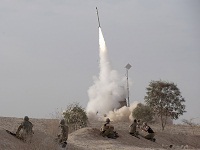Will four missiles explode the Middle East?
Against the backdrop of the threats officially declared by the United States to carry out a full-scale aggression against Syria, the attempts to ignite a war from the other side - in the Lebanese direction - look extremely disturbing. Late last week, unknown extremists fired four rockets towards Israel from the territory of the neighboring Lebanon.

Israeli aircraft struck back at one of the bases of the Popular Front for the Liberation of Palestine. For many people in the North of Israel this incident was another reminder of the Second Lebanon War that ended seven years ago, on August 14, 2006. In many northern cities air raid sirens sounded, and people hid in bomb shelters. Many of them still remember the rocket attacks of Hezbollah that continued day and night. Recently, the leader of the Shiite resistance Hassan Nasrallah came out of the bunker and spoke to the supporters about yet another threat to Tel Aviv. However, this time the Hezbollah group was not involved.
The authorities of the country condemned the terrorist attack. Beirut is not interested in starting a new Arab-Israeli war. The Lebanese army is too weak to participate in any armed conflicts. The situation is exacerbated by religious conflicts that continue to grow against the background of the events in neighboring Syria.
The Government of Lebanon has to use regular troops to keep the fragile peace and prevent the outbreak of a civil war. After a double bombing in Tripoli that killed 47 people, the North African branch of Al-Qaeda has acted with accusations against the Hezbollah. The group published a statement on the Internet in which extremists have threatened to take revenge for what he did in the name of Sunni Muslims.
Israeli military analysts do not hide their concern with the growth of various terrorist groups around the perimeter of the border. The recent incident with the firing of settlements Gesher HaZiv and Shavei Zion has identified shortcomings in the work of a missile defense system "Iron Dome." Only one of the four missiles was shot down, and the other three landed near the residential buildings. Several of the civilians were injured, and three were taken to a hospital in a state of shock.
IDF Air Force only gave a preventive response. Fighter jets fired missiles at PFLP outpost. According to local media reports, no one was hurt. The group denies any involvement in the fire. Now the militants are threatening to take revenge for Israel's recent air attack.
The "Arab Spring" has not brought peace to Israel. The fall of Hosni Mubarak in Egypt and the outbreak of a civil war in Syria have led to the emergence of new types of threats. Groups of terrorists who fired at the Israeli city of Eilat are active at Sinai traditionally popular among tourists. Tensions in the disputed Golan Heights where shots are fired almost daily are growing.
Despite the fact that this summer was the seventh in a row when Israel has managed to not get involved in military action, it does not reflect the full strategic picture. Western sources have repeatedly reported that Israel has made at least three military attacks on foreign soil over the past two months. They include the alleged destruction of weapons caches in Syria, an air strike on the Egyptian territory that prevented rocket attacks in the Negev, and the attack on the headquarters of the extremist Palestinian group in Lebanon, said Israeli Cursor.
Each of these events was covered on the front pages of newspapers, but hardly made an impression on the audience. In the eyes of the public, it was one of the most peaceful years in the last few years, the continuation of a long period of silence. Considering that these attacks have not resulted in human casualties and victims in Israel, they hardly come to the attention of the average media consumer. Other problems, such as economic decrees, provoked more interest. But Israel cannot suppress the events in the Middle East forever.
At first glance, the incident with the firing of Galilee can be considered settled. However, the likelihood of new missile or drone attacks from Lebanon in the coming months will continue. Sooner or later, Hezbollah that grew its military potential and once again threatens to bring down hundreds of missiles on Israeli cities may join the game. The Syrian conflict made Hezbollah abandon the plans for a war with Israel for some time and transfer militants to support his ally, President Bashar al-Assad in the fight against the rebels. Now, much will depend on how the events will unfold in Syria. If the United States begins military action against the Assad regime, Israel may be subjected to massive bombardment from the Hezbollah and a number of other lesser-known groups, experts warn.
Yuri Sosinski-Semikhat
Pravda.Ru
Subscribe to Pravda.Ru Telegram channel, Facebook, RSS!


